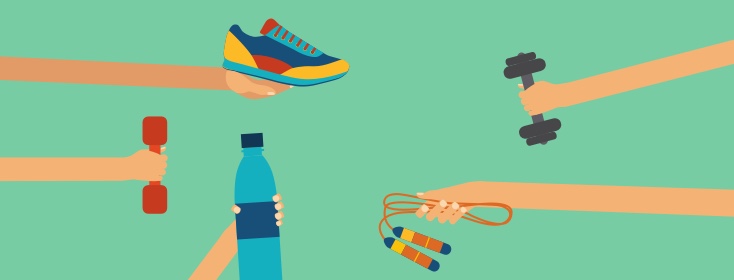“You Should Exercise More!”
“You should exercise more!”
These were the dreaded words that came out of my headache specialist’s mouth at my last appointment. She told me that aerobic exercise a few times a week (with sweating and all) can reduce migraine pain by an average of 30%. And I have absolutely no reason to disbelieve her. My own experience tells me on no uncertain terms that the more I can get my heart rate up (in non-triggering environments) the better I feel. It’s no mystery why summer vacations spent near a lake, with nightly walks and daily swims feel great. And it’s no mystery why February and March are my worst pain months of the year, because it’s hard to get outside to exercise very much at all. It makes sense! More exercise should equal less pain!
So why did I grimace when I heard these wise, well-intended words?
We know exercise can have good benefits
It might have something to do with books I've read that claim to have the answer to banishing all chronic pain that are merely long, drawn out exercise plans, like that foodie blog that promises you the best chocolate fudge brownies ever, but begins with a novel about procuring the ingredients before getting to the darn recipe! Exercise!? Thanks, tips. Glad I wasted a whole trip to the library for your magical cure-all for something I already knew about.
But it's not that simple to stick to a routine
It might also have something to do with the fact that it’s not very easy, at all, to stick to any kind of regular exercise routine when you’re dealing with frequent migraine attacks. For many of us, the recovery or “postdrome” phase means that for many hours or even days after an attack, we have limited energy and are even more prone than usual to subsequent attacks. And the tricky thing about exercise is that for many of us, it can act as a trigger. So if we have several attacks per week, with long recoveries, where exactly does the exercise fit in? How about that for a paradox? One of the things that can make us feel better in the long run can also make us feel immediately, acutely, much, much worse!
The struggle of prioritizing exercise
Prioritizing exercise is hard enough when we’re well and free of any chronic, disabling conditions. One need look no further than all the unused gym memberships when the lustre of New Year’s Eve resolutions wears off to a dull matte to see how hard it is to schedule serious exercise in around work, family, and a social life. But when work, family, and a social life are all affected, maybe even non-existent, due to pain, it’s hard to say, well, even though I can’t work, or spend time with my family and friends, or even go get my groceries weekly, no matter what, I’m going to make it to the gym.
The exercise paradox
I consider myself incredibly fortunate. After being almost completely out of commission due to migraine over three years ago, I am now able to work almost full time, spend some time with family, and manage some semblance of a social life. And it’s still hard to prioritize exercise when I want to give more of myself to all of those things.
But then there’s that evidence staring me in the face: if I could just find a way to fit in more exercise, I could potentially reduce the pain enough that I WOULD have more time for work, family, or friends.
And so, with the “exercise as preventative and trigger” paradox pushed to the back of my mind, with my tail between my legs, and with my pride fully swallowed, I hereby pledge to start engaging in some kind of aerobic activity for 20 minutes at least twice a week.
(How’s that for commitment? “Some kind of aerobic activity...” I’ll figure it out, okay?)
How do you fit in aerobic exercise despite the many demands of regular life plus migraine? Is it even possible!?
Community Poll
Do you feel comfortable advocating for yourself to your healthcare provider?

Join the conversation